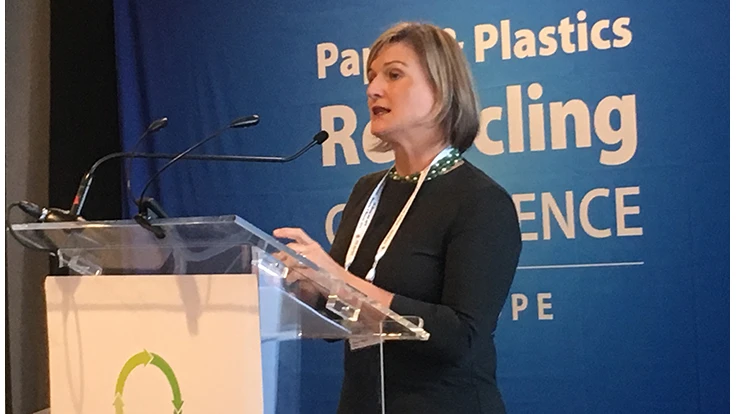
Policymakers in Europe and North America have adopted vastly different tactics when it comes to landfill diversion, a situation that can challenge global corporations, according to panelists at a session at the 2016 Plastics Recycling Conference Europe.
Clarissa Morawski, managing director of the Brussels-based Reloop Platform, said Reloop’s members and supporters include nongovernmental organizations (NGOs) and corporations that have “agreed on a way forward to the circular economy.”
She said extended producer responsibility (EPR) programs have gained support and momentum in Europe as a means to address the 63% of plastic scrap in the EU that consists of packaging.
The Circular Economy Package proposed by the European Commission sets targets 65% EU recycling rate for municipal solid waste (MSW) and 75% for packaging.
Morawski said “good, comprehensive collection systems” will be needed to reach those targets, with one of the complications being collecting plastic bottles so thy are clean enough that the recycled resins can be used in food-contact applications.
Tino Fonteijn, a regulatory affairs director with consumer products company Unilever, said the company introduced its Sustainable Living Plan in 2010, with the plan including various targets to be reached from 2020 onward. A core value of the plan is to “decouple business growth from [creating an] environmental impact.”
Unilever’s internal findings, said Fonteijn, are that its sustainable living brands “grow 30% faster than the rest of the business.”
Regarding using recycled-content resins, he said a steady volume of adequate supply is still required. “Currently there is no secure supply of the quantities at the right quality required at Unilever,” he said of the current secondary resins market.
Fonteijn said Unilever is “very supportive of the Circular Economy approach,” and added, “We need to find more ways to mine the secondary raw material opportunity that is there.”
Neil Gloger of United States-based Intergroup International provided an American perspective, saying that the 280,000 EU regulatory documents that may apply to recyclers would be intimidating to an American businessperson.
While regulatory overload is the downside in the EU, he said the public policy support in Europe helps fund recycling collection programs more substantially there than in America, and supports Europe’s plastic reprocessing sector. He said since oil and plastics prices plummeted earlier this decade, nine of the 10 largest reprocessors in the U.S. have gone out of business.
The 2016 Plastics Recycling Conference Europe was 2-3 November at the Hilton Rotterdam in the Netherlands.
Get curated news on YOUR industry.
Enter your email to receive our newsletters.
Latest from Recycling Today
- Green Cubes unveils forklift battery line
- Rebar association points to trade turmoil
- LumiCup offers single-use plastic alternative
- European project yields recycled-content ABS
- ICM to host colocated events in Shanghai
- Astera runs into NIMBY concerns in Colorado
- ReMA opposes European efforts seeking export restrictions for recyclables
- Fresh Perspective: Raj Bagaria






